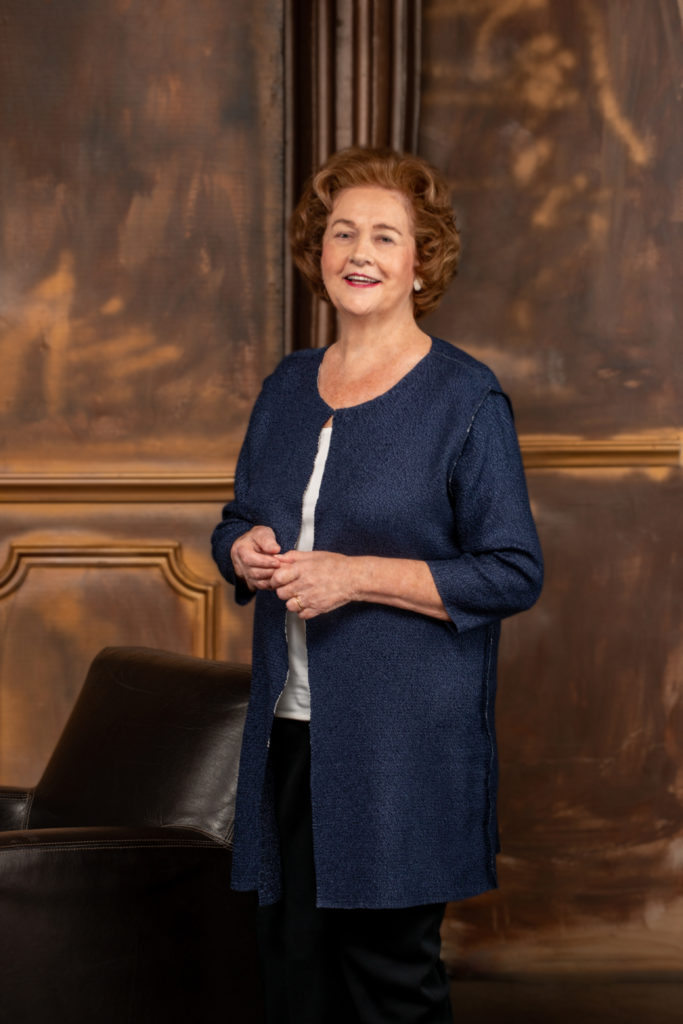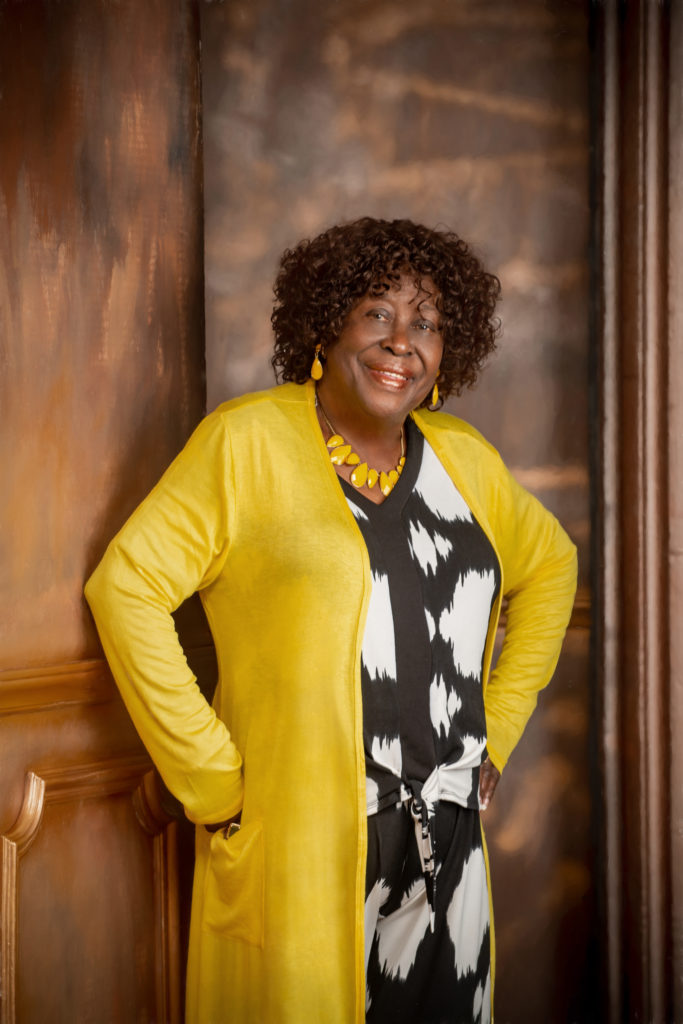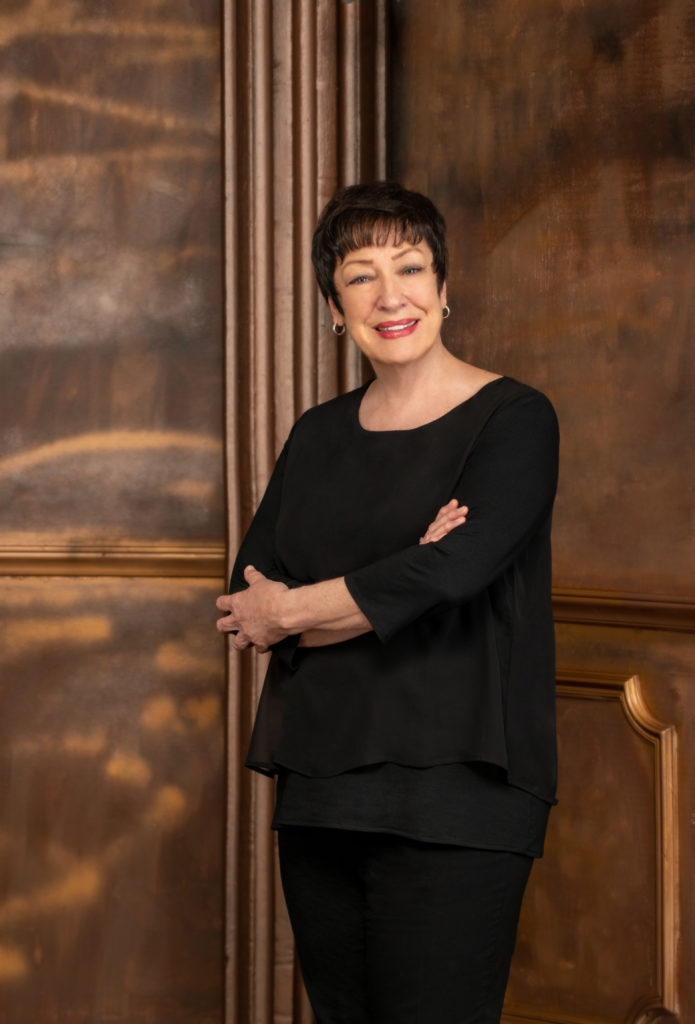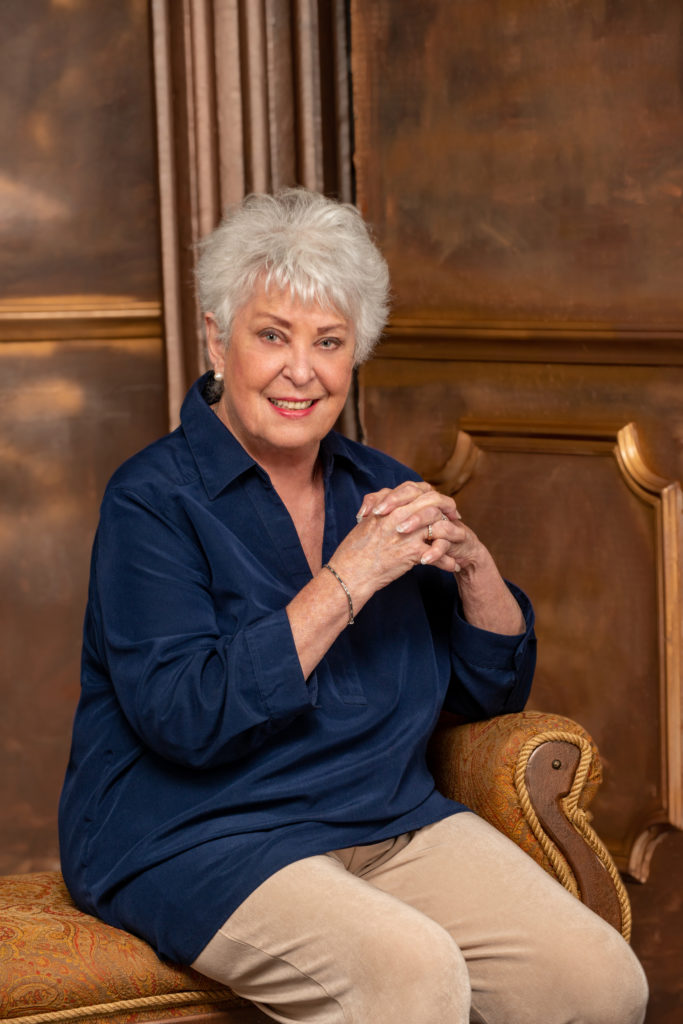Throughout history, fearless women have stepped up to become the first in their fields. Four local women share their inspiring stories.
Jo Ann Doke Smith
When Jo Ann Doke Smith was barely 9 years old, she was helping her father move a group of cattle across the highway when one of the calves broke away.
 “Daddy lassoed that calf and told me to hold onto it. The calf took off, and I held on, even though I took some flips and falls and got gravel in my knees. When Daddy caught up with me, he said, ‘Why didn’t you let go?’ I said, ‘You told me to hold on!’ I wasn’t about to let that calf outsmart me,” Jo Ann laughs, remembering.
“Daddy lassoed that calf and told me to hold onto it. The calf took off, and I held on, even though I took some flips and falls and got gravel in my knees. When Daddy caught up with me, he said, ‘Why didn’t you let go?’ I said, ‘You told me to hold on!’ I wasn’t about to let that calf outsmart me,” Jo Ann laughs, remembering.
That recollection speaks volumes about this fourth-generation Floridian who grew up in a family that raised crops and commercial beef cattle and later became the first woman president of the National Cattlemen’s Beef Association, the country’s largest agricultural organization.
“My dad served in World War I; he promised the good Lord that if he got back to the U.S. he would help feed people,” relates Jo Ann.
Lacy Doke did make it back stateside and fulfilled his promise. He grew string beans and Irish potatoes to help feed the troops during WWII, in addition to farming and raising cattle for the rest of his life.
“My sister Mary and I had no brothers; we were Daddy’s tomboys, and we loved that,” says Jo Ann. “We loved to ride horses, but even more important was that my interest in the farming and cattle meant I got to spend time with my father. He was a very strong influence on me. He was a marvelous farmer and cattleman, and a wise gentleman. He taught us that whatever we did, we needed to care about people and leave things better than we found them.”
Jo Ann was just 18 when she married Cedrik Smith, a farm boy from Wacahoota, a tiny hamlet outside Gainesville, whose family were cattle and vegetable producers. The couple had two children: son Marty, who is a cowboy and attorney in Ocala, and daughter Terri (Kane), now a CPA in Ocala.
Jo Ann worked as accountant and office manager in the family business, Smith Brothers Farming, Ranching and Construction Companies. Her influence soon spread far beyond the border of their Wacahoota ranch as she became active on multiple agriculture councils and committees, including serving as president of the Florida Cattlewomen’s Association from 1970 to 1972. She was also chairman of the board of then Munroe Regional Hospital in the ‘70s.
In 1985 she was selected Woman of the Year in Agriculture by the Florida Department of Agriculture and Consumer Services. That same year she became president of the National Cattlemen’s Beef Association and to this day is considered one of the organization’s most effective leaders. In addition to numerous appearances before Congress and on television, she traveled to Japan and China on successful trade missions to open up Asian markets to U.S. beef imports. Jo Ann notes that a major highlight of her career has been getting to know cattle producers across the U.S. and around the world.
She was founding chair of the Cattlemen’s Beef Promotion and Research Board, under which she spearheaded and developed the highly successful Beef Check-off Program.
“We worked hard to get this program through Congress and implemented,” says Jo Ann.
In 1989, President George H. W. Bush appointed her as the Assistant Secretary of Marketing and Inspection of the U. S. Department of Agriculture. During the 1990s, while still working on her family’s operation, she served on corporate boards for Purina Mills, Iowa Beef Producers and Tyson Foods Inc. Throughout her career, Jo Ann has worked on vital issues such as food safety, consumer awareness and nutrition.
In 1982 and again in 1988, she was named “Man of the Year in American Agriculture” by Progressive Farmer magazine, the “man” part of the title making her chuckle. In 2015, she was inducted into both the National Cowgirl Hall of Fame and the International Meat Association.
Although Florida has seen a great deal of development in Jo Ann’s lifetime, she’s glad there are still plenty of farms and ranches in the state. In fact, five of the nation’s top 10 cow-calf operations are located in Florida.
Despite all she has accomplished off the farm, Jo Ann is most proud of her children and family, including her four grandchildren.
“They are wonderful people with tremendous values,” she says. “I have been blessed, and I know it. I’m grateful to God every day.”
Retirement isn’t really in her vocabulary. Jo Ann continues to live on the ranch where the family runs some horses and cattle and produces timber. She also stays active serving on the boards of Community Bank & Trust and Clay Electric Cooperative.
“I can look out my window and see the bulls in the pasture. I like to dig in the dirt and garden some,” says Jo Ann about life these days.
Hearing the wind through the pines and seeing cattle in her fields still makes this cowgirl smile.
Mary Sue Rich
A desire to work hard and help others was instilled in Mary Sue Rich as a young girl. It’s a lesson she obviously learned well, as she’s continued to do just that throughout her life.
Born in Ocala, Mary Sue was raised in a loving home by parents who adopted her as an infant.
 “I was fortunate to have been adopted by wonderful people who really loved me,” she says. And that love of family has always remained strong. Mary Sue was married to Franklin R. Rich for 52 years; he passed away in 2011. The couple was blessed with four children, nine grandchildren and four great-grandchildren, all of whom give her great joy.
“I was fortunate to have been adopted by wonderful people who really loved me,” she says. And that love of family has always remained strong. Mary Sue was married to Franklin R. Rich for 52 years; he passed away in 2011. The couple was blessed with four children, nine grandchildren and four great-grandchildren, all of whom give her great joy.
Her city also brings her joy. And Mary Sue Rich is quick to acknowledge that she has seen plenty of changes in her hometown over the past seven decades.
“When I was growing up, State Road 40 was an unpaved road,” she recalls. “The city was also segregated, and a lot of people believed in that. I’ve seen a lot of growth, most of it for the betterment of Ocala.”
After earning a degree in criminal justice from the University of Central Florida, Mary Sue worked for the Florida Department of Corrections as a correctional probation senior supervisor. In 2003 she retired after 27 years with the department.
“You can help so many people working in probation and parole,” says Mary Sue. “People on probation don’t want to be there; they made a mistake, and they want to turn their lives around.”
While working in corrections, she was instrumental in starting 1st Step Inc. and has served as president of that program for nearly 20 years. Through 1st Step Inc., Marion County judges require someone sentenced to probation to pay $1 for each month they’re on supervision. This money is then used in a variety of ways, including buying groceries and paying rent to providing Christmas toys for their children. For her efforts, Mary Sue received Distinguished Service Awards from the Florida Council on Crime and Delinquency and Central Florida Community College.
In the mid-1990s, Mary Sue ran for the Ocala City Council, believing it was a way to do more for the citizens of Ocala. She was the first female African-American elected to the council and has represented District 2, which encompasses the city’s far west side, since November 1995, making this her 24th year of service.
“I’ve really enjoyed being on the council and have met a lot of wonderful people,” she says, emphasizing that serving is about many people working together rather than anything she’s done as an individual.
Mary Sue Rich has seen a great deal of change in her lifetime, and if she has her way, there will be more, particularly for the part of town she calls home.
She would love to see infrastructure in west Ocala similar to that on the east side of the city. For example, the area needs a grocery store where residents can buy fresh produce, a bank and a community center, ideally with a library.
Whether it’s working with young people through organizations like Students Against Drunk Driving (SADD) or participating in community-based programs like the Weed and Seed Task Force to help “weed out” crime and “seed in” positive actions, Mary Sue has been a bright light throughout the neighborhoods of west Ocala.
In recognition of her involvement in many community service projects, Mary Sue received the Humanitarian of the Year Award from the United Way of Marion County in 2005.
“What’s near and dear to my heart now is the homeless situation in Ocala,” she notes. “All cities have homeless, and we have a lot. While there are different organizations that help feed and clothe them, we’re trying to get homes for them. The city is planning on building a shelter; we want to have a place for them to come in off the street during the day and be able to look for the services they need.”
Mary Sue chairs the Racial Harmony and Cultural Awareness Task Force, which she helped start in the early 2000s, inspired by a lecture on racism she heard at a national event. The task force holds their Unity Breakfast every October and observes a week of diverse activities for all citizens of the city.
“It’s open to anyone to join,” says Mary Sue. “We come up with ideas on how we can get to know each other and better associate with each other. We all want the same things: for our children to have safe schools, to have a good job and food on the table. We’re more alike than we are different.”
Of all she’s done in a lifetime of community service, Mary Sue is perhaps most proud of starting the Racial Harmony and Cultural Awareness Task Force and 1st Step Inc.
“I feel these have made a big difference. I definitely think we’re getting better as a community,” says Mary Sue.
Janet W. Behnke
Janet W. Behnke has practiced law in Ocala for more than 47 years, serving clients in almost every area of civil law. Today, her practice is focused on family law, wills and probate, and real property litigation. She is also a mediator, with certifications in circuit civil, family, county and appellate mediation. Her legal career has included years of positions held, lessons learned and barriers broken.
 Janet’s family moved to Ocala in 1959. She attended Ocala Junior High School (now Osceola Middle School) and Ocala High School (now Marion Technical Institute). She has lived here ever since, except while in Gainesville attending the University of Florida from 1963 through 1971 and seven months in Lexington, Kentucky, right after completing law school.
Janet’s family moved to Ocala in 1959. She attended Ocala Junior High School (now Osceola Middle School) and Ocala High School (now Marion Technical Institute). She has lived here ever since, except while in Gainesville attending the University of Florida from 1963 through 1971 and seven months in Lexington, Kentucky, right after completing law school.
“The women’s movement helped make my legal education possible. I might not have considered it had I not read Betty Freidan’s The Feminine Mystique, written in 1963, the year I graduated from high school. I was admitted to the Florida Bar on November 19, 1971 and returned to Ocala to practice law in early 1972. My legal education and my admission to the bar opened doors for me that had not opened for other women in Ocala prior to 1972,” Janet says.
Back in Ocala in the 1970s, she was the only practicing female attorney in the entire five-county judicial circuit. In her career, Janet has represented clients before the Florida Commission on Human Relations, the Florida Division of Administrative Hearings, the Florida Public Employees Relations Commission, the Florida Department of Business and Professional Regulation, Florida’s First and Fifth District Courts of Appeal, the Supreme Court of Florida and the U.S. District Court for the Middle District of Florida. But none of those things came easily.
“The most common stereotype in the late 1960s and into the 1970s was that a woman was not as capable as a man by virtue of her gender,” she recalls. “A woman was simply a different class of citizen. Even with my law degree and admission to the bar, my law firm questioned whether it was appropriate for me to attend the monthly luncheon meeting of the local bar association, since the only members were men. At my first court appearance in Ocala, opposing counsel told the judge that he would not remain in the courtroom with ‘that female lawyer.’ I replied that I had no objection to his leaving, but I was staying.”
In 1977, Janet became a charter member of Altrusa International of Ocala, of which she has now been a member for 42 years. Her leadership was recognized again in 1980 when she became the first woman president of the Marion County Bar Association—her welcome at the monthly luncheon meetings no longer in question—and again in 1981 when she was named the first woman president of the Ocala Marion County Chamber of Commerce. After being passed over as county school board attorney in 1978 because the majority of the board did not think a woman was appropriate for the job, Behnke earned the appointment in 1984 and held the position for 10 years.
Janet even served as a Marion County court judge from 1994 to 1995, as only the second woman judge in Marion County. There are four serving female judges in Marion County today.
“I had been practicing 22 years, and I served as a judge less than a year. It was an honor and a privilege and gave me insight that has helped me be a better lawyer,” she says.
Janet maintains a passion for Marion County today, because in her words, “What’s not to be passionate about?”
“Ocala inspires community service. I grew up swimming in Silver Springs, Juniper Springs and Rainbow Springs. We have amazing horse farms, HITS and the Ocala National Forest. We have such a vibrant arts community—the Appleton Museum of Art, the Reilly Arts Center and the Ocala Symphony Orchestra. We have the Ocala Culinary Festival. We have FAFO. Our downtown gets more fabulous every time I turn around. We have so many big-hearted charitable organizations. We have so many opportunities to participate in so many different areas and such generous people with whom to participate,” she says.
Aside from her practice, Janet enjoys community service, spending time with family and friends, traveling, reading, cooking and streaming BBC mysteries. She has been a member of the YMCA since the early 1990s and still walks, swims and strength trains to stay in shape.
“I have a loving family that is very supportive and a very full life,” Janet says.
“Going to law school was against the norm for women in 1969. There were three women in my class of approximately 70 students and only nine women in the entire law school of 700 students. Now, at least half of law students are women. Although I was the first woman to practice law in the circuit, other women before me had law degrees and at least one had been admitted to the bar. I stand on their shoulders, and I hope my successes have helped the women who have come after me.”
Gail Cross
Gail Cross and her husband, Scott Cross, have lived in Ocala for 42 years. In the late 1970s, Cross was working in the Gainesville school system and had become an adjunct professor at the University of Florida, and her husband was beginning a law practice in Ocala. When the couple decided they liked Ocala enough to call it their forever home, she began looking for ways to embed herself within her new community.
 That opportunity soon arose.
That opportunity soon arose.
“I was winding down at the university, and some people here in town talked to me about running for the county commission, and I said, ‘No, thank you. I’m not interested in zoning and roads,’” Gail says. “They said, ‘That’s the whole point. We want to do something broader.’ Frankly, when I first decided to run, I thought it was public service and was very naïve about how political it was. I decided to do it and trudged all over this county talking to people, and then ended up getting elected.”
Gail was elected to the Marion County Board of Commissioners in 1984, becoming the first woman to be elected to the commission. So it was time to get to work. She met with colleagues and county residents to develop a vision for Ocala’s growth.
“You read in the paper now all these brouhahas about development changes and zoning changes. Back then there was no comprehensive plan at all, no long-term vision of what we would look like in the future,” Gail explains. “We were experiencing sudden growth, so the question was, if we don’t want to end up looking like Orlando, what do we do instead? How were we going to manage our growth in a positive way so we don’t have urban sprawl everywhere? That was difficult for people to understand, people in the building industries and such.”
After years of spearheading the effort, Gail was able to enact a comprehensive land use plan and impact fees to help manage the county’s exponential growth during the 1980s, ’90s and beyond.
But being the first woman to serve on the commission was not without its challenges.
“A lot of people had a hard time transitioning with that, specifically since it was considered to be a male position. They didn’t exactly know what to do about me,” she laughs. “It was a boys’ club. I think if they had questions, they would call another commissioner to ask him instead, and that’s OK. Change is hard for people. I was the first woman to be elected to the county commission, and there has been one on the commission ever since and two today.”
After eight years of serving as county commissioner, Gail was ready to serve her community in a new way.
“That means running for office twice, and that’s enough, believe me,” she says. “After I left the county commission, I wasn’t sure what I wanted to do next. I served a couple of years on the United Way board, including chairing the countywide fundraising campaign, where we raised the total earned after three years of same amounts. I was on the board of directors for Marion Senior Services, and the longtime executive director retired so they were advertising for a new director. I had familiarity with the organization and with grant writing and government regulations, so I applied.”
In 1996, Gail was named the executive director of Marion Senior Services, where she would spend the next 13 years improving life for senior citizens in the community.
“We made several big changes in that time. We moved to finally computerizing the scheduling we had to do with transportation and Meals on Wheels, so that was a huge jump in efficiency. We established a formalized volunteer program. We expanded the transportation program with more vans and a couple more congregate dining sites,” Gail recalls.
She says the location of Marion Senior Services at that time was a rented space in a complex, which was difficult to find. The different departments of Marion Senior Services were divvied up between different buildings, which were old and had pest control issues. Gail and her team drafted a landmark grant to fund the construction of today’s Marion Senior Services building, which is clean, on a bus route and easy to locate.
“This biggest thing we accomplished is that we wrote the first community development block grant for a nonprofit in the county and were able to get a new building, which was hugely needed. I think that really set a precedent because several nonprofits since then have used that as a funding mechanism to expand their facilities.”
Gail officially retired in 2009, but for many years filled her time volunteering with Interfaith Emergency Services.
Although the places and titles may have changed, Gail’s work always seemed to revolve around bettering life for Marion County residents.
“I’m kind of a sucker for that; I have been for a long time,” she says. “It really started when I was on the county commission because I got around the county and got to meet a whole lot of people. One thing I recommend to everyone is to get in a plane and fly over the county. You can see the interaction between the land, the springs and the rivers and the urban growth patterns. It shows you that this is a beautiful place and we need to manage it well, and we need to help the people who need help.”






